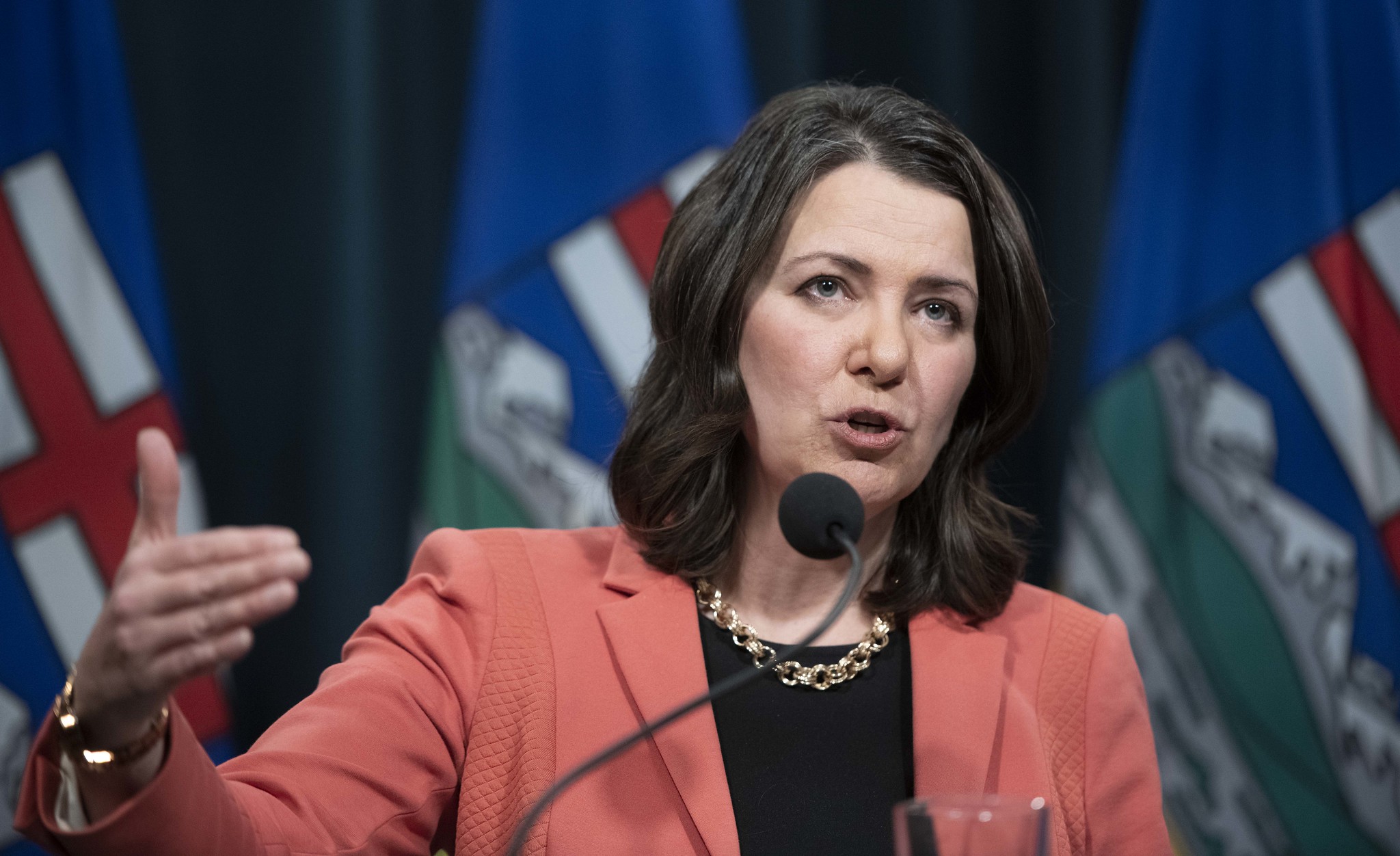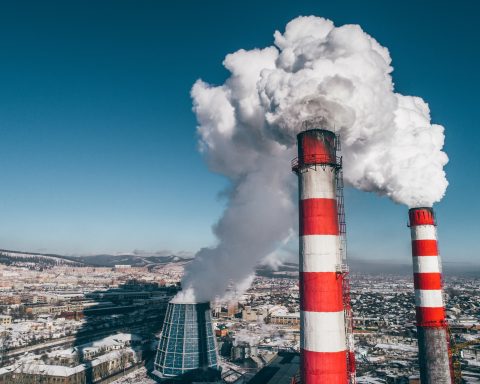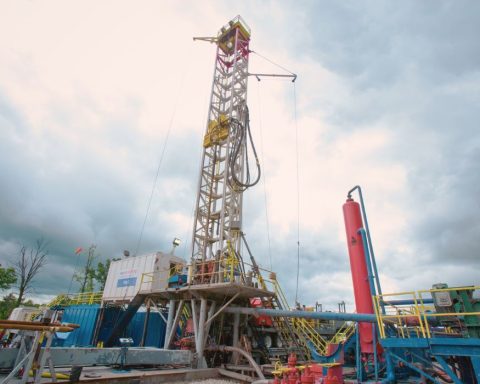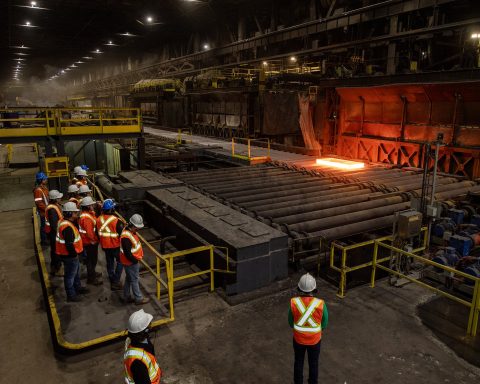Members of Alberta’s governing United Conservative Party are debating whether to abandon existing net-zero targets at the party’s annual general meeting in Red Deer this week – a move that would further signal the province’s departure from global and national priorities for mitigating emissions.
Drawing on longstanding pro-CO2 rhetoric in climate denialism, Policy Resolution #12 asks the government to scrap its decarbonization goals, remove the designation of carbon dioxide as a pollutant, and recognize the greenhouse gas as a “foundational nutrient for all life on Earth.”
“I think it has a very good chance of passing,” says Debra Davidson, a researcher in climate change impacts at the University of Alberta. “It’s not at all out of step with the position of Alberta’s United Conservative Party with respect to climate change mitigation and the energy industry for quite some time now.”
If it passes, the effect of the policy would be mainly symbolic, Davidson says, not only because it would be non-binding, but also because the Alberta government has already signalled that it has little intention of achieving its net-zero targets. Last year, for example, the province imposed a moratorium on large wind and solar projects, which led to 53 projects being cancelled and the estimated loss of $91 million in tax revenues. In the past five years, the UCP has also repealed the former NDP government’s carbon levy, opened the eastern slopes of the Rocky Mountains to coal mines, and withdrawn funding for a public transit project in Calgary.
As Stephen Legault, senior manager of Alberta energy transition at Environmental Defence, has said, the resolution is “already de facto policy.”
On the other hand, Alberta did release its Emissions Reduction and Energy Development Plan (ERED) in April 2023, aiming for a carbon-neutral economy by 2050. However, despite these commitments, “There is no evidence that Alberta has taken any action to regulate oil sands emissions as noted in the ERED plan,” says Simon Dyer, deputy executive director at the Pembina Institute. This summer, the Alberta Energy Regulator projected a 17% increase in oil sands production by 2033.
Instead, the provincial government “has focused on criticizing the federal plan to reduce oil and gas emissions,” Dyer says. Premier Danielle Smith is an outspoken opponent of Ottawa’s planned emissions cap and has launched a national “scrap the cap” ad campaign.
Even if the policy proposal mainly serves to underscore existing inaction on emissions, what’s truly notable, Davidson says, is “the degree to which it indicates a full-scale legitimation of disinformation.”
An energy policy based on fiction
The rationale for the proposal is largely erroneous. It takes a few grains of truth – that the carbon cycle is necessary and that carbon dioxide benefits plants – and couches them in the mistaken ideas that current CO2 levels are near their lowest in more than 1,000 years and that “the earth needs more CO2 to support life.”
But the carbon in our atmosphere isn’t even close to being at its lowest levels, says James Miller, a researcher on global climate change at Rutgers University–New Brunswick.
“Except for the recent period of increase, CO2 levels have been below 300 ppm for thousands of years,” he writes in an email to Corporate Knights. The atmospheric reading of CO2 reached 420 parts per million last year, according to the World Meteorological Association, which notes in a press release that “the last time the Earth experienced a comparable concentration of CO2 was 3–5 million years ago, when the temperature was 2–3°C warmer and sea level was 10–20 meters higher than now.”
And while increased carbon dioxide can be helpful for plants when everything else is equal, Miller explains, “everything else is not equal, and adding more CO2 leads to increasing temperatures, which can lead to less plant productivity.”
RELATED:
Enough renewable-energy projects have been cancelled in Alberta to power almost all its homes
Alberta risks billions in renewable investments with new development rules
Is pollution from Alberta’s oil sands way worse than the industry has let on?
Davidson calls the argument that more CO2 will be good for plants “absolutely preposterous,” not only because global warming leads to more droughts, but also because crops are temperature-dependent. Above certain thresholds, plant productivity declines precipitously, she says. NASA has predicted that factors including temperature stress from climate change could lead to a 24% decline in global maize crops as soon as 2030, which the study’s author says “could have severe implications worldwide.”
The type of CO2 boosterism expressed in the UCP policy proposal isn’t novel. Climate-denying think tanks like Alberta’s Friends of Science Society have been promoting it for many years. But the inclusion in a formal policy document represents a new development.
Climate denialism has grown significantly more entrenched in Alberta’s UCP party, political commentator David Climenhaga writes in an email to Corporate Knights. “Since Smith became premier, to a significant degree the UCP has become more like a comment thread on social media and less like a conventional political party,” he says.
Climenhaga thinks that the odds the resolution will be adopted are “extremely high, like 100%.” If so, it will create a problem for Smith, who is “heavily invested in carbon capture, both as a subsidy to the fossil fuel extraction industry and as a way to win social licence for more extraction.”
“Carbon capture is a real solution – one of the best we know of,” Smith said in November, adding that “Alberta fully intends to lead the world in this critical field.” Last year, she launched an incentive program to cover some of the capital costs associated with new carbon capture, utilization and storage (CCUS) infrastructure in the province.
But according to Climenhaga, the people behind the policy proposal are “increasingly suspicious of carbon capture, not because they think it’s a boondoggle necessarily, but because they believe, as per the resolution, that CO2 is good.”
Alberta’s self-inflicted economic wounds
Abandoning its net-zero targets would set Alberta on a lonely path, marking it as an outlier in the global economy. “A commitment to net-zero is table stakes, in terms of the bare minimum,” Dyer says.
The policy proposal may be mainly symbolic, but “it’s a symbolism that is damaging to the investment climate in Alberta,” Dyer argues. Calgary and Edmonton are home to many entrepreneurs in the decarbonization space, he says, and policies that discourage investment would be economically harmful.
Even Texas, Alberta’s oil-loving American counterpart, has embraced the renewables boom and rapidly ramped up its solar and wind capacity. Three-tenths of its net electricity in 2023 was generated from renewable sources, according to the U.S. Energy Information Administration.
The proposed measure to abandon its net-zero targets would also put Alberta out of step with its own energy sector. Most oil and gas companies see a need for energy diversification and have made commitments to reduce greenhouse gas emissions. “The industry has been very good cutting back the use of diesel and methane emissions, carbon capture – they’re very active on that side,” says Josef Schachter, president of Schachter Energy Research, in an interview with the CBC.
It was economic factors and not climate change that drove the shift toward renewables in Texas, and the same could theoretically be true in Alberta. Even if the province doubles down on science denial, that doesn’t mean it has to deny cheap renewable power.
Mark Mann is an associate editor at Corporate Knights.







